Britain and the U.S. impose economic sanctions on dozens of governments they don’t like, write Erik Mar and John Perry. Some people in Nicaragua are being targeted on the basis of little or no evidence.
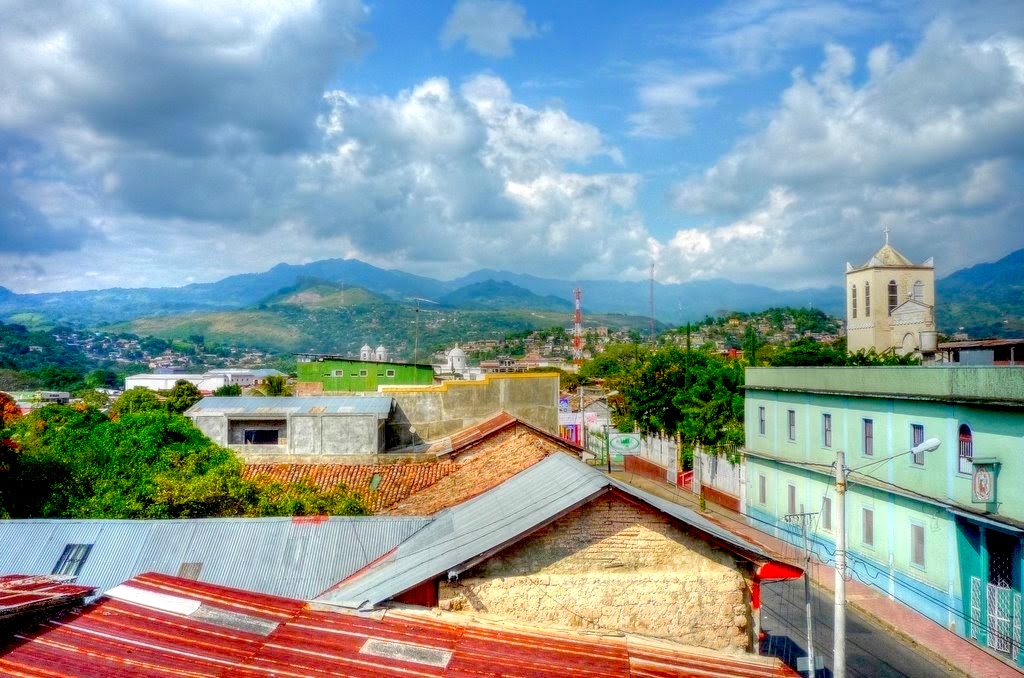
Matagalpa, Nicaragua, 2017. (AntoLa22, Wikimedia Commons, CC BY-SA 4.0)
By Erik Mar and John Perry
Declassified UK
The U.K., along with the U.S. and Canadian governments and the European Union, has created a sanctions regime targeting around 40 countries across the globe.
While economic sanctions against states are best-known, they also include thousands of individuals whose assets have been frozen or confiscated, their travel restricted and their ability to do business constrained.
Typically, names are added to a government’s sanctions lists with no prior warning or “due process.” The individuals affected are in practice unable to challenge their inclusion, since it would require expensive legal action in different countries with an uncertain chance of success.
There is a growing body of opinion, reflected in the work of those such as the Sanctions Kill campaign, that these “unilateral coercive measures” are illegal in international law if they affect the enjoyment of human rights, such as freedom from hunger or access to health care, in the countries targeted.
Neither the U.K. nor U.S. governments seem deterred either by this or by the adverse effects of their sanctions on the human rights of poor communities.
Targeting Nicaragua
One example is Nicaragua, which was initially targeted during the first Sandinista government in the 1980s, and, more recently, following nationwide protests beginning in April 2018.
Those protests quickly escalated into open and often violent confrontations between groups of protestors and groups of government supporters with the national police.
The U.K. government has sanctioned 16 public officials ranging from Vice President Rosario Murillo to various ministers or former ministers, judges and police officers.
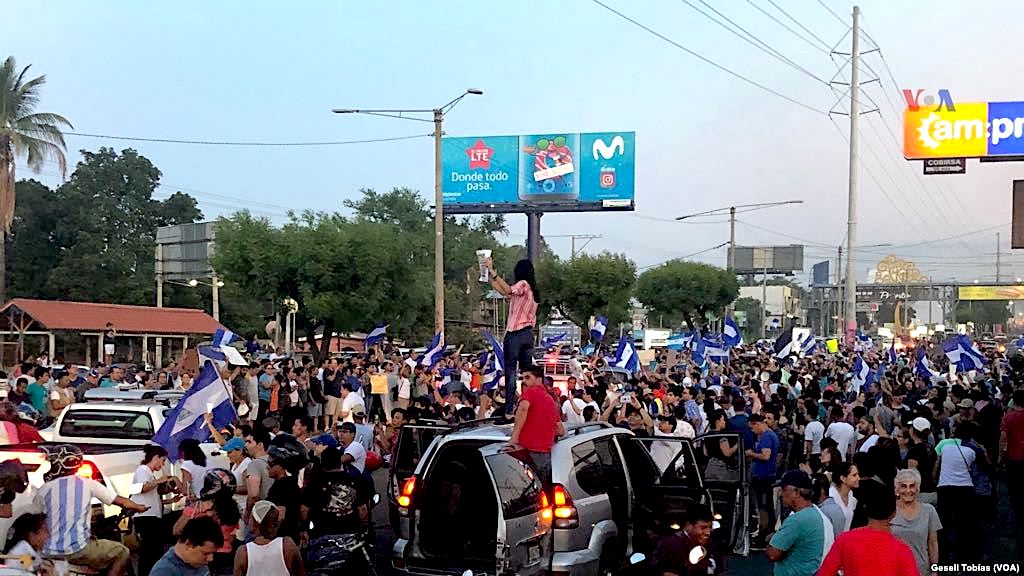
Anti-government protest in Managua, Nicaragua, April 24, 2018. (Voice of America, Wikimedia Commons, Public domain)
A year after he was sanctioned by Washington, last December the U.K. sanctioned the mayor of the city of Matagalpa, Sadrach Zelodón Rocha, one of the best known mayors of the ruling Sandinista party in the country.
Strangely, his vice mayor, Yohaira Hernández Chirino, was also added to the U.K. list, although she has never been sanctioned by the U.S., Canada or the EU.
Zelodón Rocha and Hernández Chirino are the only Nicaraguan mayors or deputy mayors on the U.K. list. The sanctions, subjecting both to “an asset freeze and travel ban,” also extend to members of their immediate families.
Freedom of Information
As one of us has known Zeledón Rocha and the rest of his immediate family for more than 30 years, we submitted a formal Freedom of Information request to the U.K. government asking for clarification of the sanctions decisions that affect both him and Hernández Chirino.
It took several months to get a reply, and it only came on the day on which the U.K. government’s information commissioner had threatened to start legal proceedings against the Foreign Office because of its failure to respond.
The most important question, of course, was on what basis the decisions had been made. The Foreign Office declined to provide specific evidence.
It stated only:
“Zeledón and Hernandez were designated for their involvement in violations of the right to life and right not to be subjected to torture or cruel, inhuman or degrading treatment or punishment, by promoting and inciting serious human rights violations against protesters.”
It added:
“Before the sanctions were imposed against Zeledón and Hernandez, evidence was collected from a variety of open sources, including civil society reports and media reports.”
Elsewhere in the response, the Foreign Office clarified that its actions relate solely to events in 2018, almost five years before the U.K. imposed its sanctions.
Nicaragua’s three months of protests in 2018 affected Matagalpa less than some other cities. But they involved, in addition to relatively peaceful marches, an attempted assault on its town hall and police headquarters, the looting and burning of the municipal depot and attacks on individual homes by various opposition groups.
Those groups also set up a roadblock controlling all traffic on the only road directly connecting the city to the Pacific half of the country, restricting the flow of food and other goods to and from the city.
Human Rights Reports
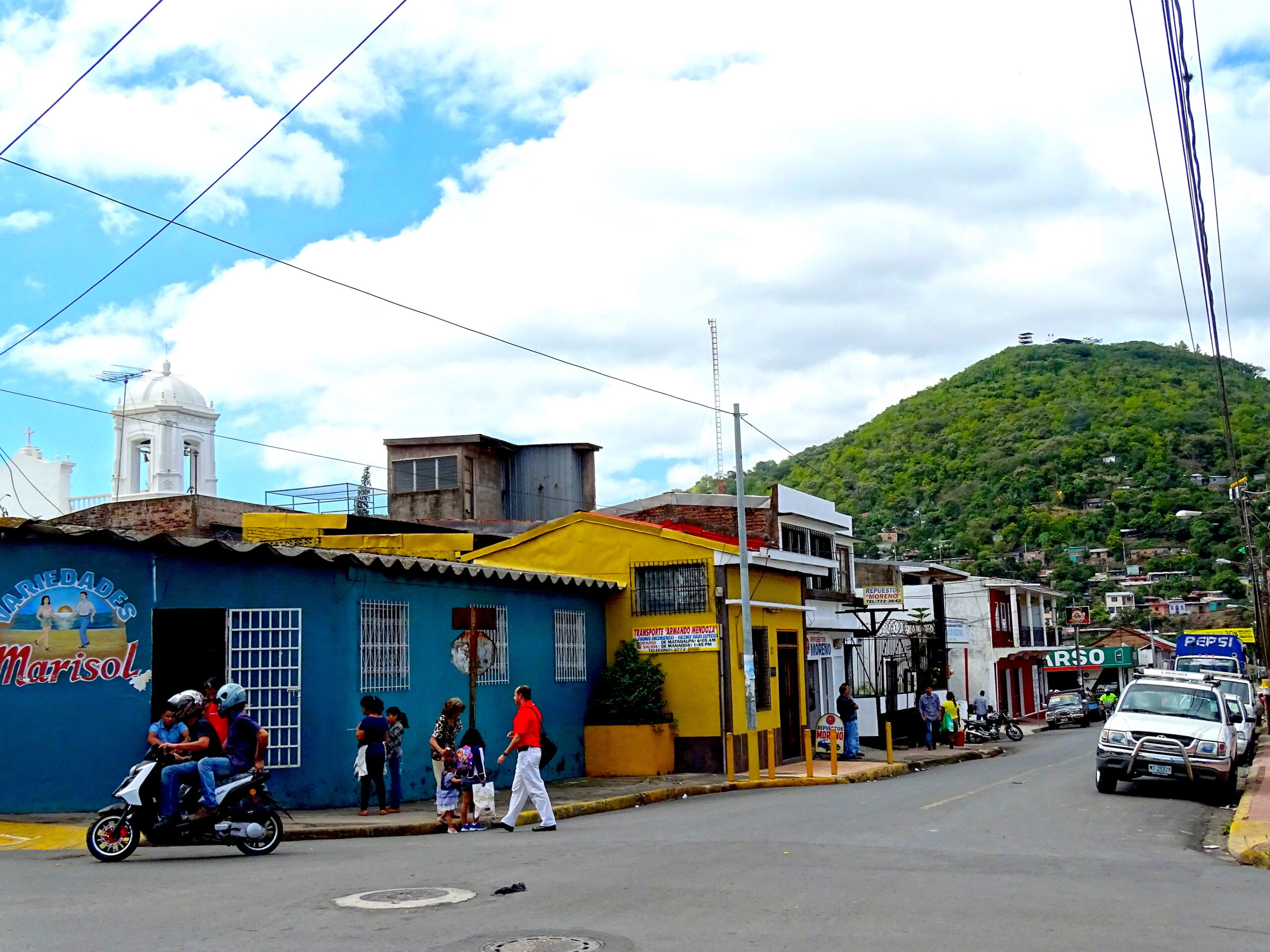
Matagalpa, Nicaragua, 2017. (Adam Jones, Wikimedia Commons, CC BY-SA 2.0)
We researched the human rights reports that may have been used by the Foreign Office, seeking to uncover hard evidence for the two classes of human rights violations which empowered the U.K. government to impose sanctions.
Perhaps the most detailed, and certainly one of the most internationally cited reports, is the one by the Grupo Interdisciplinario de Expertos Independientes.
The GIEI was set up by the Organization of American States in May 2018, with the agreement of the Nicaraguan government, and reported the following December.
Of the 500 pages in its report, around 12 are dedicated to the May 2018 events in Matagalpa, which are at the core of the accusations against Zeledón Rocha.
The GIEI report lists three deaths in Matagalpa from the relevant time period, two of whom were Sandinistas and members of the governing party and none of whom were likely targets of the mayor or deputy mayor.
The report does not attempt to link Zeledón Rocha directly to any of the three deaths. A subsequent petition by the Inter-American Commission on Human Rights makes no mention of him either.
It therefore appears that the Foreign Office’s evidence for Zeledón Rocha’s “violations of the right to life” is flimsy at best. The sanctions against him cannot therefore be due to the “right to life” class of human rights violations.
It is important to note that it is typical of many human rights reports of this period that deaths among Sandinistas, government officials or police are either unrecorded or wrongly added to the tally of deaths caused by the government. For example, six other Sandinistas or government officials were killed in Matagalpa in 2018.
Evidence?
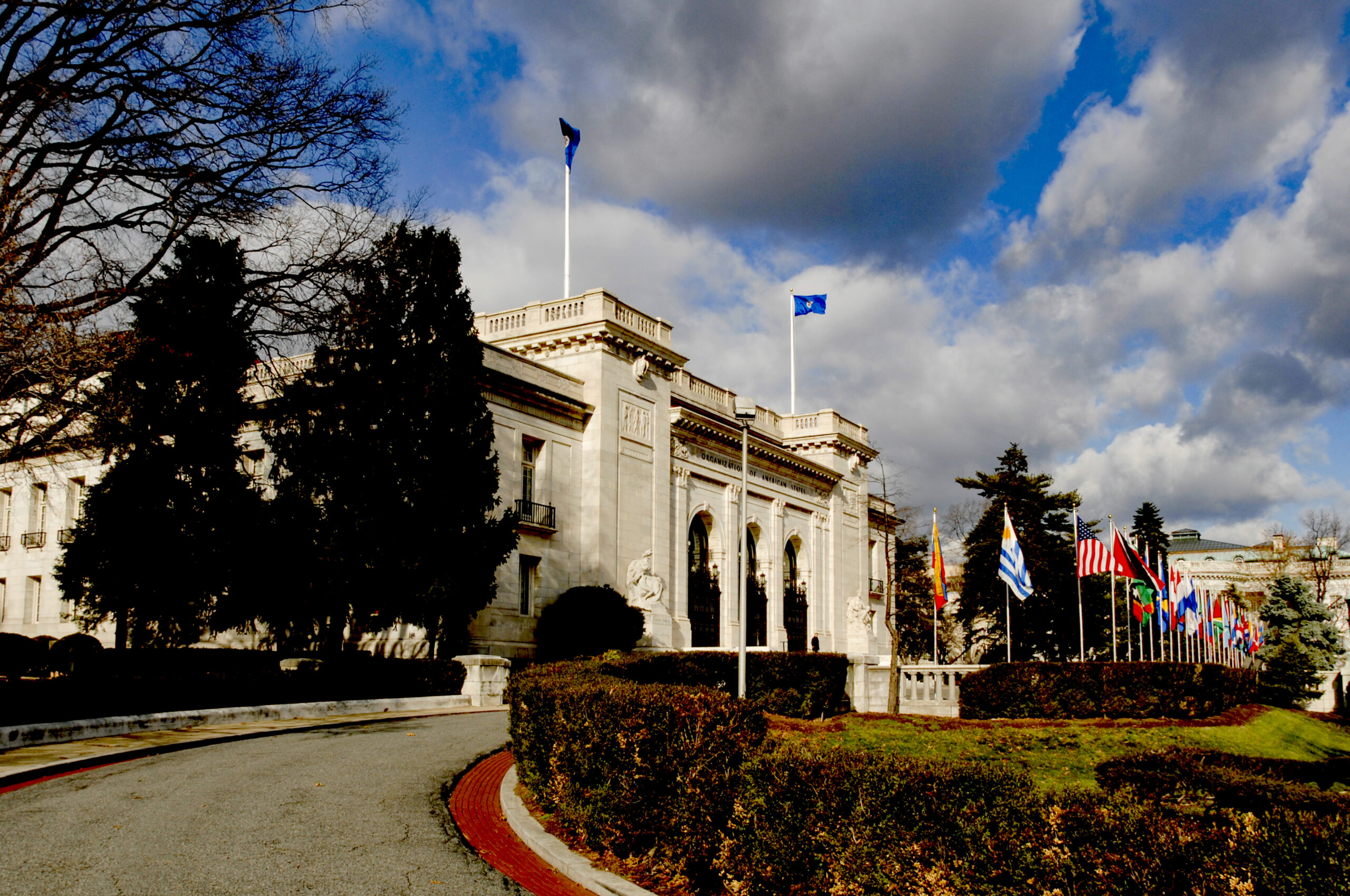
Organization of American States main building in Washington, D.C. (OEA – OAS, Flickr)
What then of the evidence for Zeledón Rocha’s violations of the “right not to be subjected to torture or cruel, inhuman or degrading treatment or punishment, by promoting and inciting serious human rights violations against protesters”, the second class of human rights violations that can serve as reasons for sanctions under U.K. law?
The sole piece of visual evidence linking him to any violations is a single photograph in the GIEI report that allegedly shows him with “shock groups” prior to May 11. Interestingly, none of those visible in the photo are armed and none are wearing any sort of military gear or face coverings.
In an adjacent photo purportedly showing the same “shock groups,” a woman is wearing shorts and sandals — hardly the sort of gear appropriate for paramilitary action. The report then goes on to cite an interview in which Zeledón Rocha was accused of “that day leading the [paramilitaries].”
That apparently sufficed as evidence, in spite of the multiple questions that might be raised. For example, why appoint Zeledón Rocha, when he was never in the military, much less in any command position?
During the 1980s, as a licenced civil engineer, he held positions in the ministries of housing and commerce, in the International Red Cross and in the Electoral Commission for the 1990 elections.
In 2001-2005 and since 2008, Zeledón Rocha has served as mayor of Matagalpa, winning national acclaim — including among opposition media outlets — for the extensive development of the city’s housing, health, transportation, educational and recreational infrastructure.
His administrative, technical, and managerial skillset seems conspicuously inappropriate for leading paramilitaries, especially given the plethora of other Sandinistas who have extensive military experience gained during the Contra war of the 1980s.
The Wounded
The GIEI report states that 40 people were wounded during the May 15 confrontations between protesters and counter-protesters over a blockade which cut the entire city off from the Pacific side of the country, starving Matagalpinos of supplies and food.
Although there are several photographs of wounded protesters, Zeledón Rocha’s name is unmentioned. Instead, blame for the wounded is laid at the feet of the national police, who allegedly fired with military grade weaponry.
Turning to Hernández Chirino, she does not appear at all in the GIEI report, nor in any others we have been able to find. Her appearance in the sanctions list is therefore puzzling and appears to be a case of guilt by association.
She most certainly does not appear to be directly implicated in any way to any human rights violations and was purportedly surprised, if not bewildered, by her inclusion in the sanctions list.
The case for “promoting and supporting grievous violations of human rights” against Hernández Chirino, at least according to the GIEI report, is literally non-existent, and the case against Zeledón Rocha verges on non-existent.
The stated rationale behind the sanctions therefore cannot possibly be the real rationale behind them.
Symbolic Importance
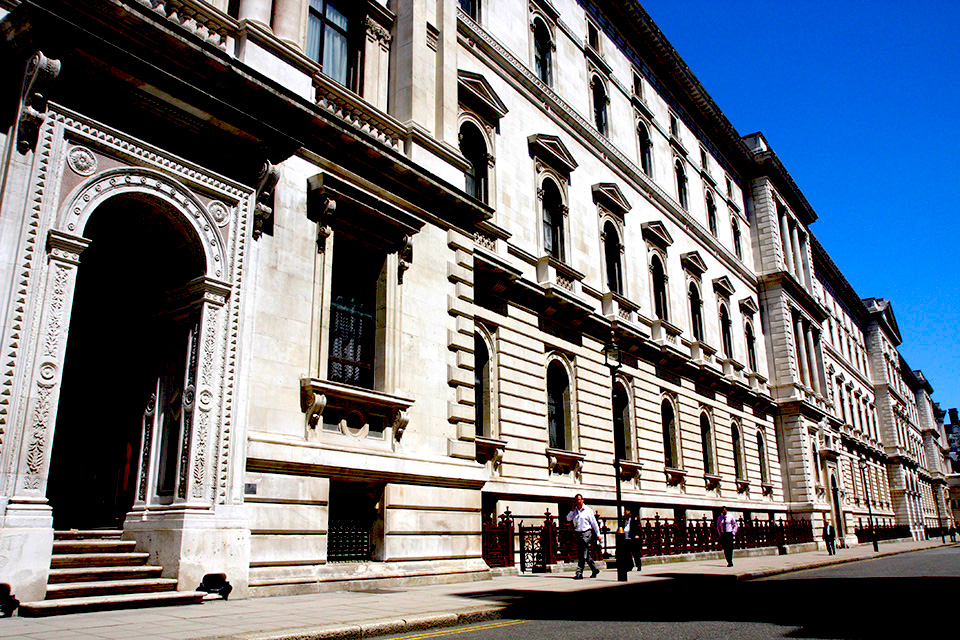
U.K. Foreign Office in London. (Foreign and Commonwealth Office, Wikimedia Commons, CC BY 2.0)
It’s hard to believe that those in the U.S. or U.K. governments charged with deciding who to sanction are aware of the subtleties of Nicaraguan politics at the municipal level. The most straightforward and most probable explanation for the inclusion of Zeledón Rocha and Hernández Chirino in the sanctions list is their symbolic political importance.
Zeledón Rocha in particular is widely known for his achievements, including in opposition media outlets, in developing the region’s infrastructure, for the competency of his administration, and for his willingness to work with all sectors of Nicaraguan society, regardless of their political persuasion.
He has therefore earned ever increasing responsibilities, making him an obvious target for those aiming to discredit the government and its policies.
We should also ask why sanctions are used at all. It is widely acknowledged, even by conservative think tanks such as the Cato Institute, that they’re utterly ineffective.
Neither Zeledón Rocha nor Hernández Chirino have any assets or interests in assets in any of the countries that have sanctioned them. Neither of them takes holidays or travel professionally to any of those countries.
Both the U.S. and the U.K. governments could easily have discovered that the net effects would be close to zero, and both had the means and the reach to research all that we have covered in this article before imposing their sanctions.
They did not consider it necessary or important to do so, raising the question of what exactly they aimed to achieve, or what behaviour they aimed to change in imposing the sanctions.
Political Theatre
Given the lack of compelling evidence coupled with the predictable ineffectiveness of the sanctions, the inescapable conclusion is that the sanctions are simply a piece of political theatre, for domestic consumption in the imposing countries.
Both the U.S. and the U.K. governments would apparently like to be seen as promoting “free and open societies around the world,” in the parlance of the U.K. foreign secretary. Unilateral sanctions are an approved means towards that end.
Underlying all of this, however, is the uncomfortable truth that this symbolic political posturing has real, material effects, perhaps not directly on those sanctioned, but on the overall climate of international aid, loans and cooperation with a poor country still trying to recover from the violence of 2018 and the economic damage of the Covid-19 pandemic.
The actions against individuals may be ineffective, but the wider economic sanctions are not. Nicaragua has not been as badly hit in this respect as neighbouring Cuba or Venezuela, but has seen the blocking of loans from the World Bank, several trade sanctions and only minimal medical aid from Western countries during the Covid crisis.
According to Nicaragua’s finance and housing minister, development loans have fallen from an average of over $800 million before 2018 to under $300 million since then, mainly because of U.S. influence over or blocking of finance from international institutions.
Just as in the cases of Zelodón Rocha and Hernández Chirino, there is neither due process nor any accessible appeal mechanism where Nicaragua can contest these wider actions of foreign governments.
Erik Mar lived in Matagalpa, Nicaragua, for several years and now lives in the United States.
John Perry writes from and lives in Masaya, Nicaragua, where he has lived for 20 years.
This article is from Declassified UK.
The views expressed are solely those of the author and may or may not reflect those of Consortium News.

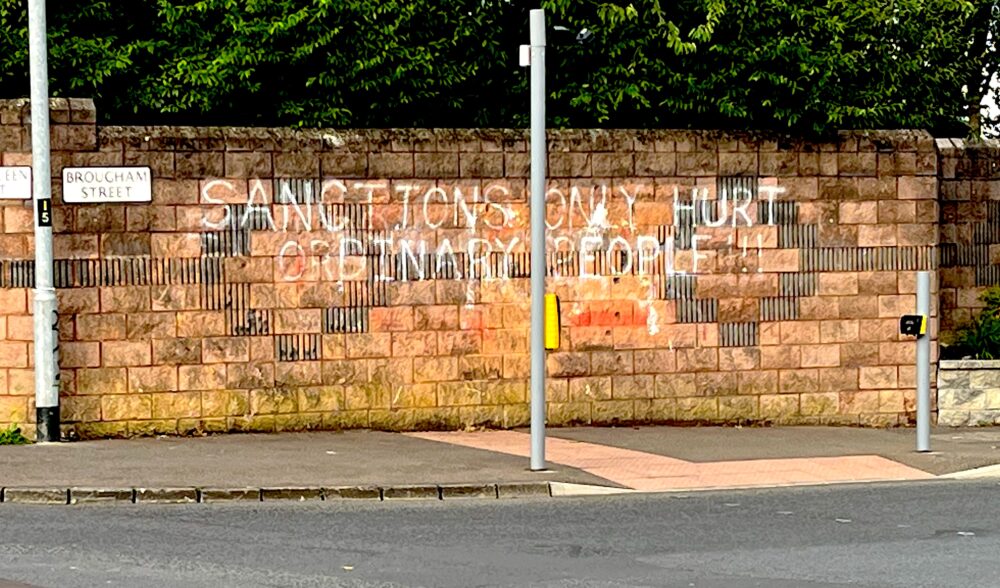

“Come on . . . !, Seriously?”
Look kids this is what you get when U.S. foreign policy is dictated by the Deep State individual national interests , via CIA etc. , the World Bank and the International Monetary fund.
I posit that the actual food chain is #1 those who direct the funding of the funded by the World Bank and are closely connected to what I refer as the “Super Wealthy Elitist, the “SWET” an represent the international “Deep State”, those super wealthy multi-billionaires with no faces or news coverage and direct phone lines to various governments around the world.
The International Monetary fund hands out the cash as directed by corporate interests in conjunction with their individual nations intelligence of “special” political interest – you don’t play nice with us you don’t get any money kinda thing- someone will invade your country or you will have a revolt. You get the idea.
Hedge fund operators who operate internationally and those who run the off shore banking industry. Follow the money. Hunter Biden in China and Ukraine and Bill Browder in Russia. Individuals obtaining some well deserved somewhat recent notoriety.
I figure this Deep State stuff took on a seriously growing life of it’s own around 1972 when a Pakistani Banker worked with the Safari Club after establishing the Bank of Commerce and Credit International. Can you say GHW Bush, once CIA always CIA.
911 was a turning point, a water shed moment in history, markers were called in the Petro Dollar was on limited time. Everyone might benefit from learning the History of the International Consortium of Investigative Journalists. In November of 2014 with the Luxembourg leaks, events in 2015 the ICIJ was spun off into an entirely independent organization.
What happened? World communication at the speed of light caught up with them, the time gap between what they were doing and when the knowledge became common decreased very significantly.
Don’t take my word for it do some research. Maps exist of satellite communication routes world wide. If one builds a time line based on known maps to exist over time we can quickly see how quickly data increased occurred. Search “current global high speed communication maps ” for a start. ICIJ has produced some such maps and the intelligence community comes in about here.
Really nice work here Misters Mar & Perry
Thanks CN
The book “Confessions Of An Economic Hitman” is the only book one needs to read to understand the folly and hypocrisy of US foreign policy.
I hope one day they will consider sanctions a crime against humanity and the western countries force to repair for the “damages”; who suffers is almost always the most vulnerable. It is unacceptable that UN is an accomplice in this crime, in contributing to force more and more people into poverty when the number one goal of SDG is to eliminate poverty by 2030.
Even Switzerland the central bank of the “western mafia” applies sanctions, but it does it more cleverly, by calling them “targeted sanctions”, that is, aiming at specific persons giving the idea that dirty Switzerland is better than any other European countries, while in fact it just the same.
Since I moved to Milan to work, and learn quite a bit about Switzerland I have lost all the admiration I had for that country.
Even aiming at “few” rich, corrupt and powerful, as Switzerland claim, the damage to society can be substantial, as these individuals are central to the current state of the economy, in country like Afghanistan or Syria. Of course, then Switzerland send millions in aid to sort of show the nice face like missionary gave blankets to the Native Americans infected with smallpox, measles, influenza, etc; lets be clear, before applauding Switzerland and other western countries, humanitarian aid IS NOT human development, it is like putting a a plaster on a gangrenous wound.
I might be wrong, but the primary reason behind sanctions it is actually to make the population suffer, even die if necessary , in order to create social unrest and ultimately a revolution (remember the recently departed Madeleine Albright what she said about sanctions?); a secondary purpose is to prevent those “authoritarian” countries to become successfully economically and eventually socially. The west knows well that it is not democracy that makes a country wealthy and stable, but it is actually wealth that increases the chances to become more socially just, although, up to a point democracy might help a country to become even wealthier. By sanctioning them, they keep them in perennial poverty and the leadership is forced to adopt even stronger repression measures to maintain social order, thereby giving another reason to the west to say, “see, they violate human rights, let sanction them even more”. At least, that is what I believe.
The sanctioning is a perverse mechanism that only a sick culture like the western could devise; although, recently, something it is no longer working like before, as those countries start to understand how the mechanism works and collaborating with each other to break the cycle
I have a method for predicting the actions of the US Government.
Binge watch gangster movies. Pick several of your favorites. Mine are ones with DeNiro and Pacino. Binge watch your favorite gangster movies, one after the other. Continue this until you start to think like a gangster. When the actions of the gangsters in the films seem perfectly normal.
In that mental state, you will find that you can predict the actions of the US government with incredible accuracy.
You might be onto something there Will. Coincidentally, i’ve just watched “Bugsy” starring Warren Beatty and Annette Bening. He certainly was very unhinged, like the politicians appear to be.
Why on earth would anyone believe that American ‘sanctions’ have anything to do with ‘evidence’? C’mon. Nobody in the American system, and no one in the American electorate, has asked for or produced ‘evidence’ for over a decade now.
That was so Adlai Stevenson. Today, they just stand up, loudly proclaim something that they made up that suits their purpose. They say White is Black and Black is White. They claim Up is Down and Down is Up. The Big Lie is the core of American foreign policy. They have felt since Cheney/Bush that they make reality with their mighty media microphone that obediently says whatever they command it to say.
Sanctions are simply economic warfare, where America hits other people, brags about the pain they cause — then acts all peaceful and does their ‘innocent face’ that everybody knows is a lie. They wage economic warfare, diplomatic warfare, and any other type of warfare that they can imagine, but then on the days when they aren’t trying to starve people into submission, they pretend that they are at peace. The only people dumb enough to be fooled by this are the Americans.
But evidence has nothing to do with it.
The US, UK & Israel are Satans very own representatives in this world. They’re the root cause of all wars, pain, misery and suffering, everything stems from this axis of evil.
Fine article. Thank you. Just one commente besides. Anti-racism/sexism workers try to teach us just how much language matters. Nicaragua, ‘necessarily’ forced into serving as a ‘feeder country’ to the maw of the slash-and-burn uber-consumerist U.S. and co., is NOT a ‘poor’ country. With vast natural resources, two ocean coasts, untold amounts of sun, water and wind, Nicaragua harvests everything from first-class coffee to excellent rice; is virtually 100% food sovereign; and 75% powered from renewable sources. Its population of a mere 6.8 million enjoys a land area somewhat larger than half the UK/only slightly smaller than New York state. Essentially, therefore, Nicaragua should be paradise. To call it ‘poor’ is surely to be complicit in our self-proclaimed ‘First World’ refusal to accept responsibility for the ravages visited on the entire ‘Third World’ to prop up our otherwise unsustainable way of life (far from incidentally, well on the way to destroying almost all life on Earth). Nicaragua is not a ‘poor’ country. It is a naturally wealthy – and indeed exemplary – country, ‘actively being-made-poor’ to sustain the otherwise devastatingly unsustainable. Language MATTERS.
At some point in the not so distant future, the sanctioning countries may very well find themselves on the receiving end of what they have been dishing out. “Instant karma’s gonna get you!”
Western democracies are governed by ruthless criminal syndicates. Laws mean nothing to them, simple decency means nothing, they are people without character, no integrity, no morals, and no conscience. They are ruthless killers, a disgrace for all of us. All international institutions controlled by Western democracies like the US/UK have lost credibility that includes the UN. NATO is a most aggressive and destructive alliance with a trail of blood, death, and destruction to prove it. US/NATO must go.
I agree with you 100%.
The Rule of Law: We don’t care about no stinking laws.
If I were a leader of a sanctioned country, I’d join a military end economic alliance of the sanctioned, and invite the major powers among us to build military, naval and airbases in my country. I kind of see this as the writing on the wall, whereupon, the US, UK, European Union et. al. will scream in dismay and shock.
So much for standing up for human rights and democracy. And the Yanx and Brits still don’t understand why they are so hated all over the world.
Economic warfare (so-called sanctions) unless approved by the UNSC, are illegal. The US is a signator to the UN Charter, and it was ratified by the US Senate. Therefore, the sanctions are a flagrant violation of US law as well.
The Rule of Law? How quaint.
Laws are only for others. The so-called democracies are so undemocratic they have no debate about sanctions and the consequences they have on mostly poor nations, most Americans have no idea what sanctions are meant to do and do to nations. They see nothing wrong with destabilizing societies, by deliberate starvation and the harm malnutrition does to children, it is ruthless, brutal economic warfare, as criminal as killing with bombs and bullets, and the UN does nothing because the USA is in control of the UN. The disgrace our government brings upon us most Americans don’t know because the corporations in control of the government own and control the MSM, they control and manipulate what people are allowed to know. And Ignorance is Bliss for most people.
Right on. Thank you.
The UNSC could not be more useless, which is true for the whole UN. The US is the most destructive hegemon and the UN follows orders.
The UGLY Americans are back in full force. They were never really gone but did the ugly jobs more or less in the dark, now they are out there in the bright daylight for all to see.
Well, um, y’know…market forces?
JonnyJames I hear you 5 X 5 and could not agree more.
Here is here is the big problem, as I see it. The Deep State driven by greed for treasure and power never have bowed to the rule of law unless someone held their heads down by the neck. The CIA is paid help to obtain desired results for the corporate interests world wide through the global financial institutions, as I note in my comment here earlier.
The rule of law does not apply in an outlaw country driven by the interests of multi-billioniares. That rule of law thing only applies to the rest of us peasants. You only find justice at the UN if you have a majority and our day maybe coming. The weaponization of money was supposed to have outlived it’s usefulness, another lie in a long list of others.
TNX CN